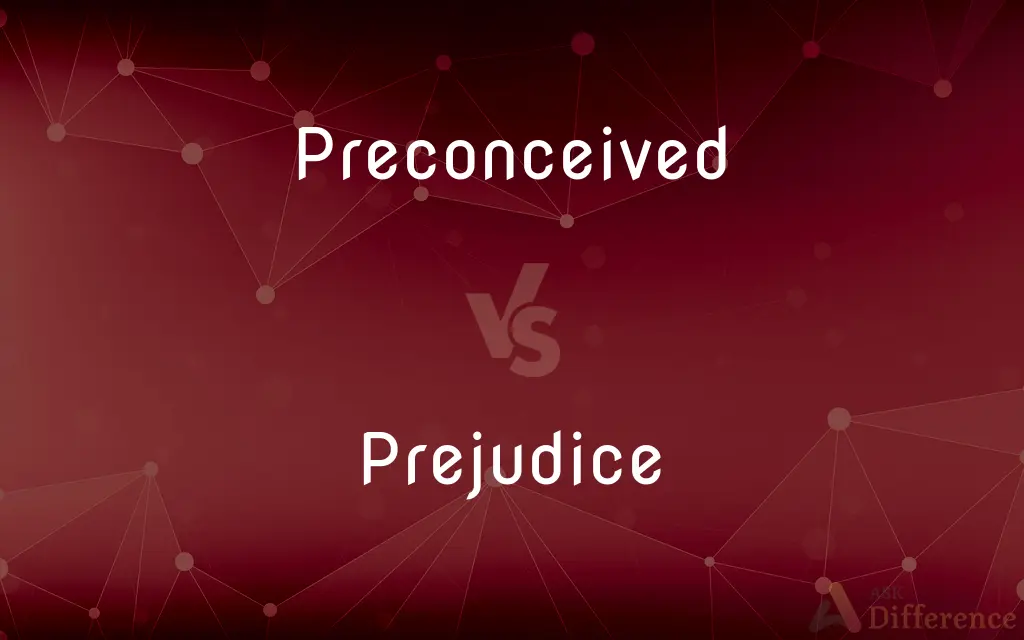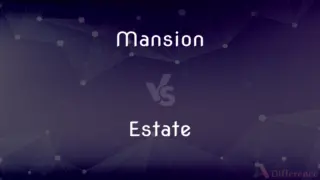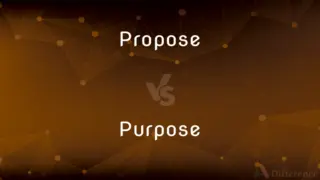Preconceived vs. Prejudice — What's the Difference?
By Maham Liaqat & Urooj Arif — Updated on April 23, 2024
Preconceived refers to ideas or opinions formed before having evidence or full knowledge, whereas prejudice involves preconceived and often unjust opinions about others.

Difference Between Preconceived and Prejudice
Table of Contents
ADVERTISEMENT
Key Differences
Preconceived notions can be about any subject and typically form based on incomplete information or assumptions, not necessarily leading to negative outcomes. In contrast, prejudice is a specific type of preconceived opinion that negatively affects attitudes towards people based on their race, gender, or other characteristics, often resulting in discrimination.
In the realm of science, researchers might enter a study with preconceived ideas about the possible outcomes, which they aim to test against empirical evidence. On the other hand, prejudice in scientific research can skew methodology or interpretation of data, leading to biased results that can perpetuate stereotypes.
In education, students might have preconceived notions about the difficulty of a subject, affecting their motivation and approach. Whereas prejudice in educational settings can manifest in lowered expectations towards certain groups of students, influencing their academic performance and opportunities.
The media can play a role in shaping preconceived notions about various topics through coverage and framing of issues. Conversely, media can also spread prejudice, whether intentionally or unintentionally, by perpetuating negative stereotypes or biased reporting.
In everyday interactions, a person might have preconceived ideas about what to expect in a new city based on its reputation. Prejudice, however, could lead them to avoid certain areas or people based on unfounded negative stereotypes, impacting social harmony and individual experiences.
ADVERTISEMENT
Comparison Chart
Definition
Ideas formed beforehand without full information
Preconceived judgment or opinion, often negative and directed towards people
Basis
Lack of information, assumptions
Biases, stereotypes
Impact on Judgment
Can be neutral or biased
Generally negative and harmful
Common Contexts
General decision making, academic learning
Social interactions, employment, law enforcement
Examples of Manifestation
Expecting a movie to be boring without seeing it
Discriminating against a group without knowing individuals
Compare with Definitions
Preconceived
Based on previous assumption rather than actual experience.
His preconceived dislike for the dish disappeared after he tried it.
Prejudice
Dislike, hostility, or unjust behavior deriving from preconceived and unfounded opinions.
The policy was criticized for promoting prejudice.
Preconceived
Formed before having the evidence for its truth or usefulness.
He had a preconceived notion that the new job would be stressful.
Prejudice
An adverse opinion or leaning formed without just grounds or before sufficient knowledge.
She faced prejudice at work due to her political views.
Preconceived
Beliefs formed beforehand.
They entered the negotiation with preconceived beliefs about the other party’s intentions.
Prejudice
Preconceived opinion not based on reason or actual experience; bias.
His decision was influenced by prejudice against the applicant's background.
Preconceived
Conceived or formed in advance.
Her preconceived ideas about the city were proven wrong when she visited.
Prejudice
A preconceived belief about someone or something.
Local prejudices about food were hard to overcome.
Preconceived
An idea or opinion developed before knowing or experiencing the facts.
Her preconceived opinion about the novel changed after reading it.
Prejudice
Damage or harm resulting from some judgment or action of another in disregard of one's rights.
Their actions showed prejudice against minority groups.
Preconceived
(of an idea or opinion) formed before having the evidence for its truth or usefulness
The same set of facts can be tailored to fit any preconceived belief
Prejudice
The act or state of holding unreasonable preconceived judgments or convictions
“This is not actually a volume of the best short stories … These are just the stories that I like best, and I am full of prejudice and strong opinions” (Ann Patchett).
Preconceived
To form (an opinion, for example) before possessing full or adequate knowledge or experience
Notions that were preconceived and based in ignorance.
Prejudice
An adverse judgment or opinion formed unfairly or without knowledge of the facts
A boy with a prejudice against unfamiliar foods.
Preconceived
(of an opinion or notion) Conceived beforehand: formed ahead of time.
Prejudice
Irrational suspicion or hatred of a particular social group, such as a race or the adherents of a religion.
Preconceived
Simple past tense and past participle of preconceive
Prejudice
Detriment or harm caused to a person, especially in a legal case
The delay operated to her prejudice.
Preconceived
(of an idea or opinion) formed beforehand; especially without evidence or through prejudice;
Certain preconceived notions
Prejudice
Preclusionary effect, preventing further pursuit of one's interests
The case was dismissed with prejudice.
Prejudice
To fill with prejudice or cause to judge with prejudice
My rural upbringing has prejudiced me against living in the city.
Prejudice
To affect detrimentally or harmfully by a judgment or act
Negative media coverage prejudiced people's opinion of the mayor.
Prejudice
(countable) An adverse judgment or opinion formed beforehand or without knowledge of the facts.
Prejudice
(countable) A preconception, any preconceived opinion or feeling, whether positive or negative.
Prejudice
(countable) An irrational hostile attitude, fear or hatred towards a particular group, race or religion.
I am free of all prejudices. I hate everyone equally.
Prejudice
(obsolete) Knowledge formed in advance; foresight, presaging.
Prejudice
Mischief; hurt; damage; injury; detriment.
Prejudice
(transitive) To have a negative impact on (someone's position, chances etc.).
Prejudice
(transitive) To cause prejudice in; to bias the mind of.
Prejudice
Misspelling of prejudiced
Prejudice
Foresight.
Naught might hinder his quick prejudize.
Prejudice
An opinion or judgment formed without due examination; prejudgment; a leaning toward one side of a question from other considerations than those belonging to it; an unreasonable predilection for, or objection against, anything; especially, an opinion or leaning adverse to anything, without just grounds, or before sufficient knowledge.
Though often misled by prejudice and passion, he was emphatically an honest man.
Prejudice
A bias on the part of judge, juror, or witness which interferes with fairness of judgment.
Prejudice
Mischief; hurt; damage; injury; detriment.
England and France might, through their amity,Breed him some prejudice.
Prejudice
To cause to have prejudice; to prepossess with opinions formed without due knowledge or examination; to bias the mind of, by hasty and incorrect notions; to give an unreasonable bent to, as to one side or the other of a cause; as, to prejudice a critic or a juryman.
Suffer not any beloved study to prejudice your mind so far as to despise all other learning.
Prejudice
To obstruct or injure by prejudices, or by previous bias of the mind; hence, generally, to hurt; to damage; to injure; to impair; as, to prejudice a good cause.
Seek how may prejudice the foe.
Prejudice
A partiality that prevents objective consideration of an issue or situation
Prejudice
Disadvantage by prejudice
Prejudice
Influence (somebody's) opinion in advance
Common Curiosities
How can preconceived notions affect everyday life?
Preconceived notions can affect decisions, relationships, and behaviors based on incomplete or inaccurate information.
How does prejudice differ from discrimination?
Prejudice is an attitude or belief, often negative, while discrimination is the action based on that prejudice.
How can one overcome preconceived notions?
Overcoming preconceived notions involves seeking full information, open-mindedness, and direct experience.
Can preconceived ideas ever be positive?
Yes, preconceived ideas can be positive if they lead to optimistic attitudes or expectations, though they still may lack a factual basis.
What is prejudice?
Prejudice is a negative, preconceived opinion that is not based on reason or actual interaction, often directed towards people.
What does preconceived mean?
Preconceived refers to ideas or opinions formed before one has adequate knowledge or experience.
Why is it important to challenge prejudices?
Challenging prejudices is crucial for promoting fairness, equality, and inclusive societies.
Can education reduce prejudice?
Education can significantly reduce prejudice by exposing individuals to diverse perspectives and factual information.
How does social interaction influence prejudice?
Positive social interactions with diverse groups can decrease prejudice by breaking down stereotypes and fostering understanding.
What are some common sources of prejudice?
Common sources include cultural norms, personal experiences, media portrayals, and upbringing.
What impact does media have on prejudice?
Media can reinforce or challenge prejudices through the portrayal of different groups and issues.
What role does empathy play in overcoming prejudice?
Empathy can help individuals understand and appreciate the experiences and feelings of others, reducing prejudiced attitudes.
How do preconceived notions and prejudices affect the workplace?
They can lead to biased hiring practices, unfair treatment, and a non-inclusive work environment.
Is it possible to be completely free of preconceived notions?
While challenging, it is difficult to be completely free of preconceived notions due to inherent biases and limited experiences.
What are some effects of prejudice in social settings?
Prejudice can lead to social exclusion, tensions, and a divided community.
Share Your Discovery

Previous Comparison
Mansion vs. Estate
Next Comparison
Propose vs. PurposeAuthor Spotlight
Written by
Maham LiaqatCo-written by
Urooj ArifUrooj is a skilled content writer at Ask Difference, known for her exceptional ability to simplify complex topics into engaging and informative content. With a passion for research and a flair for clear, concise writing, she consistently delivers articles that resonate with our diverse audience.














































